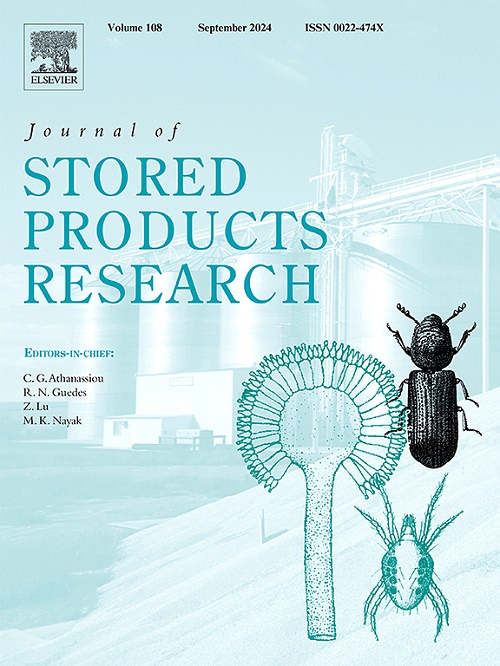热处理和贮存对PET包装食用植物油降解和迁移的影响
IF 2.7
2区 农林科学
Q1 ENTOMOLOGY
引用次数: 0
摘要
本研究调查了与塑料包装中污染物渗入食品有关的食品安全问题,重点研究了储存在聚对苯二甲酸乙二醇酯(PET)容器中的葵花籽油、玉米油和菜籽油的降解。该研究评估了热暴露(40°C和60°C)和长期储存(长达12个月)对从西班牙和德国购买的油的物理化学特性和感官品质的影响。这项研究分为两个实验:E1分析热处理后的油,E2检查储存一年后的油。重金属,如锑(Sb)、镉(Cd)、铜(Cu)、铅(Pb)和铁(Fe),使用先进的质谱技术进行检测。采用傅里叶变换红外光谱(FT-IR/MIR)和差示扫描量热法(DSC)对PET降解进行评估。结果显示,12个月后,酸度、过氧化物水平和感官退化增加,“腐臭”特征增加。PET表现出化学变化,包括羰基指数升高和非晶化,其中铜(Cu)是最普遍的金属,并且Sb水平在热暴露后升高。这项研究加强了对热量和储存如何影响污染物从PET包装迁移到种子油的理解,突出了对食品安全和产品质量的影响。本文章由计算机程序翻译,如有差异,请以英文原文为准。
Impact of thermal treatment and storage on degradation and migration in edible seed oils packaged in PET
This research investigates food safety concerns related to contaminants leaching from plastic packaging into food, focusing on the degradation of sunflower, corn, and rapeseed oils stored in polyethylene terephthalate (PET) containers. The study evaluates the effects of heat exposure (40 °C and 60 °C) and long-term storage (up to 12 months) on the physicochemical properties and sensory qualities of oils purchased from Spain and Germany. The research is divided into two experiments: E1 analyzes oils after heat treatments, and E2 examines them after a year of storage. Heavy metals, such as antimony (Sb), cadmium (Cd), copper (Cu), lead (Pb), and iron (Fe), were detected using advanced mass spectrometry techniques. PET degradation was assessed using Fourier Transform Infrared Spectroscopy (FT-IR/MIR) and Differential Scanning Calorimetry (DSC). Results showed increased acidity, peroxide levels, and sensory degradation, with a rise in “rancid” characteristics after 12 months. PET exhibited chemical changes, including an elevated carbonyl index and amorphization, with copper (Cu) being the most prevalent metal, and Sb levels rising after thermal exposure. This study enhances understanding of how heat and storage affect contaminant migration from PET packaging into seed oils, highlighting implications for food safety and product quality.
求助全文
通过发布文献求助,成功后即可免费获取论文全文。
去求助
来源期刊
CiteScore
5.70
自引率
18.50%
发文量
112
审稿时长
45 days
期刊介绍:
The Journal of Stored Products Research provides an international medium for the publication of both reviews and original results from laboratory and field studies on the preservation and safety of stored products, notably food stocks, covering storage-related problems from the producer through the supply chain to the consumer. Stored products are characterised by having relatively low moisture content and include raw and semi-processed foods, animal feedstuffs, and a range of other durable items, including materials such as clothing or museum artefacts.

 求助内容:
求助内容: 应助结果提醒方式:
应助结果提醒方式:


